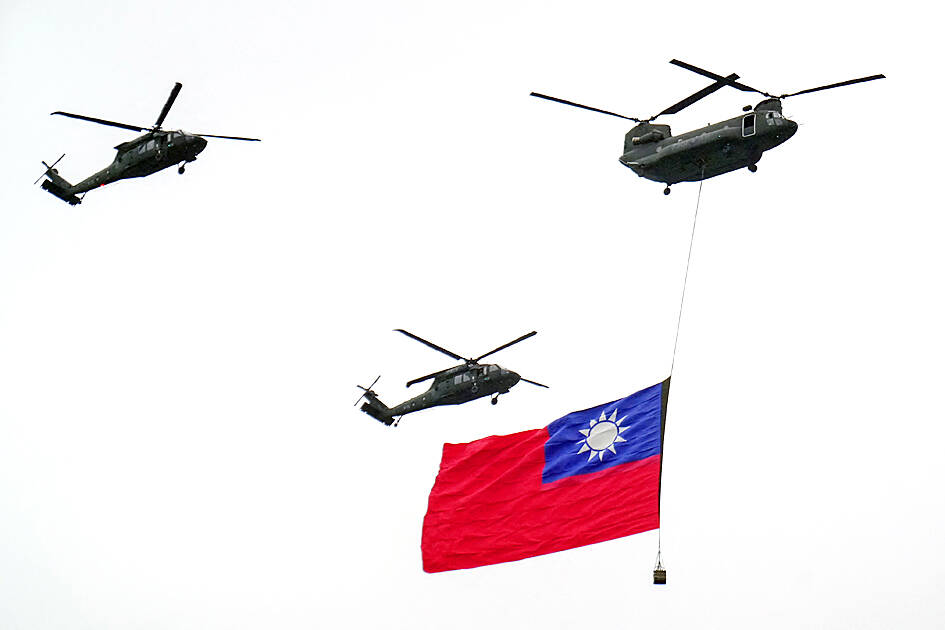Taiwan matters to the world because of its economic and technological achievements, its geopolitical location and its democratic system, Alliance of Democracies Foundation executive director Jonas Parello-Plesner said.
The former Danish diplomat and expert on US, European and Chinese foreign policy, made the remarks on Friday in a conversation with the Hudson Institute’s Asia-Pacific security chair, Patrick Cronin, for the Hudson event in Washington titled “Why Taiwan Matters to the US and the World.”
Cronin said that Taiwan matters not least because it is a major flash point for conflict in the Indo-Pacific region and Asia.

Photo: Walid Berrazeg, AFP
People are worried that with the wars in Ukraine and the Middle East, another in the Indo-Pacific region could lead to a cataclysmic conflict, he said.
“I think there are three real big reasons why Taiwan matters to all of us, even though you could say we’re sitting here roughly 8,000 miles [12,874km] away from Taiwan, and it’s a small island, kind of the size of Maryland,” Parello-Plesner said.
“First is economic and technological,” he said, adding that Taiwan is indispensable for the world’s tech industry, as 90 percent of the world’s most advanced and smallest semiconductors are produced in Taiwan.
A Bloomberg Economics estimate showed that a Chinese blockade of Taiwan could cost the global economy US$10 trillion — about 10 percent of global GDP, which would be the equivalent of the combined economies of California, Texas and Florida disappearing overnight, he said.
If a conflict were to break out in Taiwan, it would in many ways stop the world economy, he said.
Second is “the military and geopolitical side,” as a conflict would not just involve China, but the US as well, which would put the militaries of the world’s two largest powers in the Taiwan Strait, Parello-Plesner said.
The victor “would define who is the leading power in the 21st century,” he said.
Last, “it would also define whether we live in a free or less free world if 23 million Taiwanese were suddenly subjugated by the Chinese Communist Party and fall under their rule,” especially with the ongoing Ukraine war, which is also involves an autocratic neighbor attacking a smaller democratic neighbor, he said.
China could attack Taiwan in many different ways, including politically, diplomatically and economically, so there is a wide range of attacks that Taiwan must prepare for, he said.
Regarding economic resilience, Parello-Plesner said Taiwanese are already doing part of it in many ways, reorienting their economy from being heavily reliant on China to doing more trade with democratic allies in other regions.
Europeans can contribute by directly telling China that European companies are willing to take losses and move out of the Chinese market, which might be a surprise to the Chinese leadership, he said.
Western companies have been spineless, such as giving in to Beijing’s requests to list Taiwan as a province of China, he said.
“So as Europeans, part of our preventive diplomacy should be to give that message to the Chinese leadership as much as we can,” he said.

An essay competition jointly organized by a local writing society and a publisher affiliated with the Chinese Communist Party (CCP) might have contravened the Act Governing Relations Between the People of the Taiwan Area and the Mainland Area (臺灣地區與大陸地區人民關係條例), the Mainland Affairs Council (MAC) said on Thursday. “In this case, the partner organization is clearly an agency under the CCP’s Fujian Provincial Committee,” MAC Deputy Minister and spokesperson Liang Wen-chieh (梁文傑) said at a news briefing in Taipei. “It also involves bringing Taiwanese students to China with all-expenses-paid arrangements to attend award ceremonies and camps,” Liang said. Those two “characteristics” are typically sufficient

A magnitude 5.9 earthquake that struck about 33km off the coast of Hualien City was the "main shock" in a series of quakes in the area, with aftershocks expected over the next three days, the Central Weather Administration (CWA) said yesterday. Prior to the magnitude 5.9 quake shaking most of Taiwan at 6:53pm yesterday, six other earthquakes stronger than a magnitude of 4, starting with a magnitude 5.5 quake at 6:09pm, occurred in the area. CWA Seismological Center Director Wu Chien-fu (吳健富) confirmed that the quakes were all part of the same series and that the magnitude 5.5 temblor was

The brilliant blue waters, thick foliage and bucolic atmosphere on this seemingly idyllic archipelago deep in the Pacific Ocean belie the key role it now plays in a titanic geopolitical struggle. Palau is again on the front line as China, and the US and its allies prepare their forces in an intensifying contest for control over the Asia-Pacific region. The democratic nation of just 17,000 people hosts US-controlled airstrips and soon-to-be-completed radar installations that the US military describes as “critical” to monitoring vast swathes of water and airspace. It is also a key piece of the second island chain, a string of

The Central Weather Administration has issued a heat alert for southeastern Taiwan, warning of temperatures as high as 36°C today, while alerting some coastal areas of strong winds later in the day. Kaohsiung’s Neimen District (內門) and Pingtung County’s Neipu Township (內埔) are under an orange heat alert, which warns of temperatures as high as 36°C for three consecutive days, the CWA said, citing southwest winds. The heat would also extend to Tainan’s Nansi (楠西) and Yujing (玉井) districts, as well as Pingtung’s Gaoshu (高樹), Yanpu (鹽埔) and Majia (瑪家) townships, it said, forecasting highs of up to 36°C in those areas